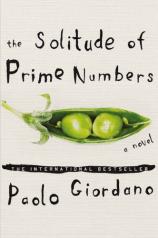The Solitude of Prime Numbers
Review
The Solitude of Prime Numbers
It’s rare that a novel that has a mathematical concept as its central trope should concern itself so intimately and sincerely with matters of the heart as well as the head. But THE SOLITUDE OF PRIME NUMBERS, Paolo Giordano’s prize-winning debut, does so beautifully, engaging readers’ brains and emotions in equal measure.
Just as we learn arithmetic in childhood, Giordano’s book seems to suggest, we also learn at an early age how to engage with --- or retreat from --- the world based on the experiences we have in childhood and youth. The narrative explores this concept through the lives of two characters.
At the age of six, Alice is already terrified of disappointing her parents --- almost as terrified as she is of downhill ski racing, her father’s great dream for her. Following a particularly embarrassing accident, Alice skis off by herself --- and into her first, foundational experience of utter isolation, one that will leave her marked for life.
Young Mattia is also no stranger to solitude; although he has an identical twin sister, he distances himself from Michela as much as possible. Michela has some developmental delays, and as they enter primary school, Mattia comes to view Michela increasingly as a liability to prospective friendships. So when they’re both invited to a birthday party, Mattia encourages Michela to linger at a nearby park while he attends. But when he returns hours later, there’s no sign of her, and over the next decades, she is never found.
As young adolescents, Mattia and Alice encounter each other at school. Both emotionally and physically damaged --- Alice is an anorexic, and Mattia repeatedly cuts his own hands and arms --- they feel utterly alone and yet recognize themselves in each other, their past and present pain, and their intimate knowledge of solitude.
Mattia is a gifted mathematician, Alice a budding photographer. It’s fitting, then, that Giordano should choose to couch their tentative, complicated relationship in terms of aesthetics and of mathematics. At one point, as the two of them hold hands, Giordano writes that “there was a shared space between their bodies, the confines of which were not well delineated, from which nothing seemed to be missing and in which the air seemed motionless, undisturbed.” Vivid (at times disturbingly so) visual images like this one define Alice and Mattia’s relationship to the world and to each other, but it is in mathematics that the novel positions its truest, most profound metaphors. In the unlikely guise of the phenomenon of “twin primes,” pairs of prime numbers separated by a single even number, Alice and Mattia’s story gains gravity and tragedy equally: “Mattia thought that he and Alice were like that, twin primes, alone and lost, close but not close enough to really touch each other.” This touching-but-not-touching comes to define the young people’s love for each other, a love that comes to seem both completely natural and utterly impossible.
Shaun Whiteside’s English translation from the original Italian skillfully conveys the simplicity and restraint of Giordano’s prose. In fact, simplicity, or elegance, best sums up THE SOLITUDE OF PRIME NUMBERS. It would be easy to sensationalize Alice and Mattia’s tragedies, to turn their lives into the stuff of melodrama. Far more difficult --- and, in the end, more devastating --- is the narrative restraint that Giordano exercises here. The result is a quietly elegant, beautifully composed novel in which its sadness becomes even more poignant in its simplicity.
Reviewed by Norah Piehl on January 23, 2011
The Solitude of Prime Numbers
- Publication Date: March 18, 2010
- Genres: Fiction
- Hardcover: 288 pages
- Publisher: Pamela Dorman Books
- ISBN-10: 0670021482
- ISBN-13: 9780670021482





